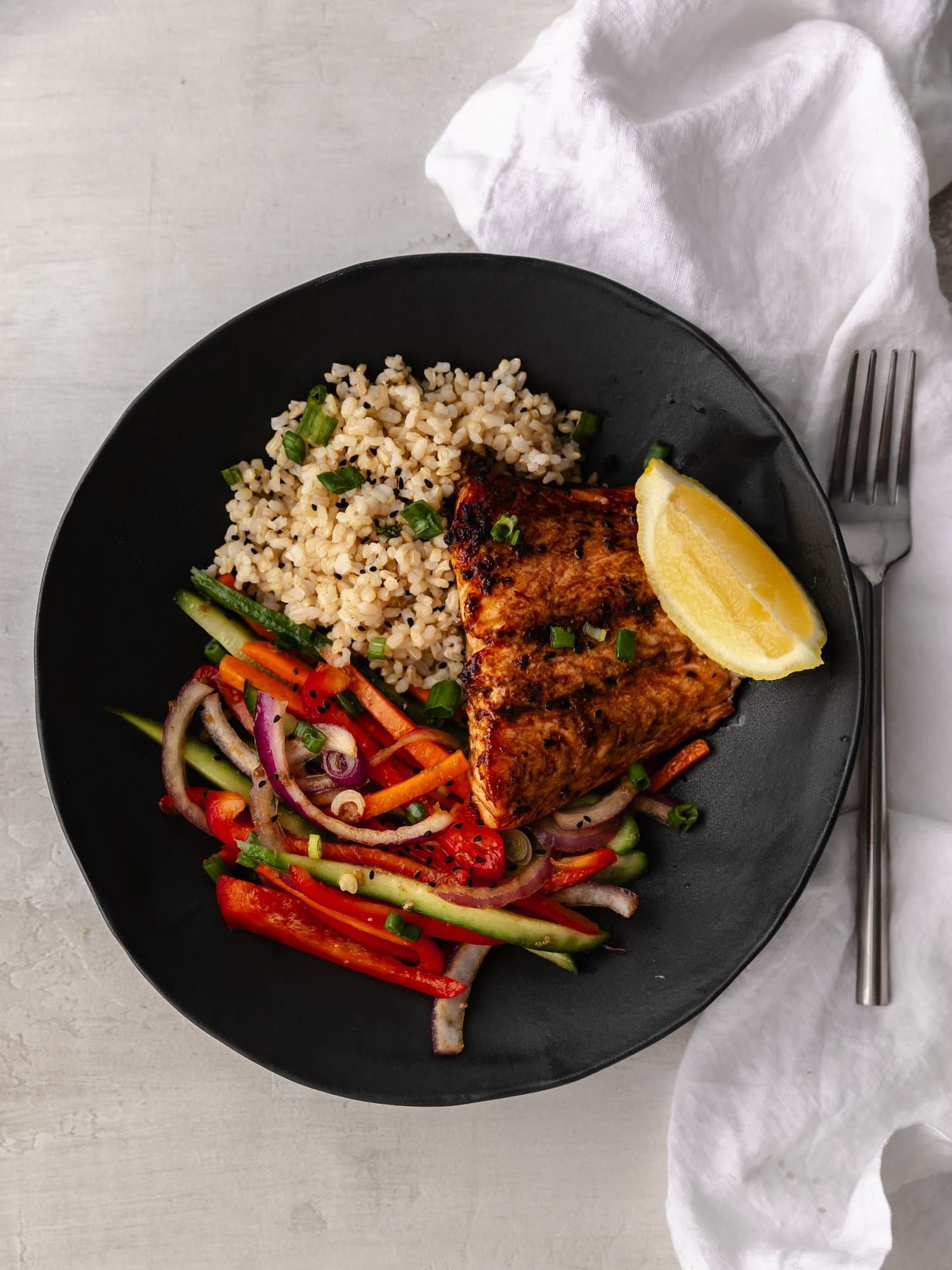pcos and nutrition
What is PCOS?
Approximately 10% of women of reproductive age develop a hormonal disorder called Polycystic Ovarian Syndrome (PCOS) (1). However, up to 70% of women with PCOS go undiagnosed. The pathophysiology of PCOS is mainly around hormonal imbalance, chronic low-grade inflammation, insulin resistance, and hyperandrogenism, all of which impair ovulation and increase the risk of related comorbidities, such as endometrial cancer and type II diabetes. The three main factors used to diagnose PCOS are hyperandrogenism, ovarian morphology, and anovulation (2).
Many people think of PCOS as strictly a hormonal disorder, affecting ovaries and ovulation, but it’s in fact also a metabolic disorder that has effects throughout the whole body.
How does PCOS impact the body?
Symptoms of PCOS include (1):
Infrequent/irregular menstrual periods and/or no menstrual periods
Infertility due to lack of ovulation
Hirsutism or increased hair grown on the face, chest, stomach, back, thumbs or toes
Acne, oily skin, and dandruff
Weight gain, especially in the abdominal area
Thinning of hair on scalp
Pelvic or abdominal pain
Insulin resistance is a key pathophysiological feature in PCOS (3). About 85% of women diagnosed with PCOS have insulin resistance, meaning their body blocks glucose from going into cells. This causes the body to produce more insulin, leading to elevated blood sugar levels, weight gain, chronic inflammation and an increased risk of developing type 2 diabetes (4). Due to these factors, nutrition and lifestyle factors are crucial in the management of PCOS.
How diet can affect PCOS
Currently, there’s insufficient evidence-based research conclusions that suggest the “best” diet or dietary intake to provide positive health outcomes for women with PCOS. Though this is the case, lifestyle and nutrition strategies are a part of the internationally-recognized evidence based guidelines for the management of PCOS symptoms.
When managing PCOS, a multifactorial approach is ideal, and diet plays a key role. It can help with weight-loss, if needed, and it can also help to manage hormonal imbalances and issues associated with PCOS.
PCOS—Friendly Foods
Low glycemic index foods:
Glycemic index (GI) of food is how quickly it raises blood glucose levels after consumption. It works as a ranking system (1-100)—separating foods into three categories, low GI, medium GI, and high GI. Choose carbohydrates with low glycemic index (1 to 55), as they will have a slower effect on blood glucose which research has shown can improve insulin sensitivity and menstrual regularity (5).
Examples of foods with low GI:
Low-fat yogurt
Most fruits and vegetables
Minimally processed grains, such as brown rice and whole-grain bread
Healthy fats
Healthy fats that include polyunsaturated fatty acids like omega-3 fatty acids can help improve insulin resistance and other metabolic markers such as triglycerides and cholesterol (6). Fats are also needed for proper hormone production and to aid in the absorption of fat soluble vitamins (A,D,E,and K).
Foods high in omega 3 fatty acids:
Fatty fish such as salmon, mackerel, herring, and anchovies
Fish oil
Nuts such as walnuts and flaxseeds
Chia seeds
You can also incorporate healthy fats into your diet through small adjustments like cooking oil. Swapping your cooking oil for extra virgin olive oil or avocado oil, which have high smoke points, is a quick and easy way to increase your consumption of healthy fat.
High-fiber foods
Low intake of dietary fiber in women with PCOS is associated with insulin resistance and hyperandrogenism. Dietary fiber can help combat this by slowing down digestion and reducing the effect of insulin resistance and sugar on the blood
Foods high in fiber:
Cruciferous vegetables such as brussel sprouts and broccoli
Berries
Sweet potatoes
Green leafy vegetables
How to manage PCOS
Lifestyle change rooted in holistic nutrition and wellness is often most successful in achieving positive health outcomes for women with PCOS. These recommendations include focusing on eating a balanced diet of whole grains, fruits, vegetables, lean proteins, and low-fat dairy, engaging in daily physical activity, managing weight, and other lifestyle factors such as reducing smoking and excessive drinking if necessary (1, 7).
While there are no specific diet recommendations for women diagnosed with PCOS yet, there are ways to integrate the PCOS-friendly foods listed above to manage PCOS symptoms such as weight gain and blood sugar spikes.
Women with PCOS can focus on eating small, healthy meals throughout the day in order to manage possible spikes in blood sugar. A meal planning nutritionist can help design smaller, balanced meals with a mix of protein, carbs, and fiber to ensure a slow release of glucose into the bloodstream. This approach helps regulate insulin production and supports better blood sugar management.
Examples of small frequent meals:
Balanced oatmeal bowl with berries and nut butter
Whole grain lunch wrap with lean protein (turkey or chicken), goat cheese, avocado, and lettuce
Balanced snacks such as trail mix, fresh fruit with peanut butter, or cheese and crackers
Foods to avoid with PCOS:
If eliminating food from your diet, focus on identifying foods that spike blood sugar. These include items such as:
Fried foods
Ultra-processed / packaged convenience foods
Red meats and processed lunch meats
Saturated fats
Sugary snacks
Sugar-sweetened beverages
It’s important to note the importance of working with your doctor and healthcare team to manage your PCOS symptoms and long-term health outcomes. If you’re interested in changing your diet to manage your PCOS, talk with a Registered Dietitian Nutritionist.
The bottom line
PCOS is a hormonal disorder that affects the whole body. With its complex pathophysiology, PCOS often comes with insulin resistance, irregular menstrual cycles, and weight gain. It’s also a leading cause of infertility. While research has not yet identified exact dietary interventions that can help treat PCOS symptoms, there are lifestyle and diet changes that can help to manage them. Focusing on a balanced diet with small frequent meals, incorporating healthy fats and high-fiber ingredients, and selecting low glycemic index foods are great ways to manage weight and reduce the effects of insulin resistance. Working with a nutrition coach online can provide personalized guidance on meal planning and lifestyle changes to better manage PCOS symptoms.
Related articles
FAQ
-
Androgens are “male” sex hormones that help to regulate sex characteristics in the body. Androgens are present in everyone, as they play diverse roles in our bodies during puberty. They are also the precursors of estrogens. The four types of androgen hormones include; (8, 9)
Testosterone
Dihydrotestosterone (DHT)
Dehydroepiandrosterone (DHEA)
Androstenedione
Women with PCOS tend to produce more androgens causing ovulation and fertility issues and extended period cycles.
-
Some examples of low-glycemic index foods are non-starchy vegetables like broccoli, cauliflower, and carrots, fruits, high-fiber grains and wheat products like brown rice, whole wheat pita, or quinoa, and beans.
Get more recipes and resources — join my substack newsletter!
Paying subscribers receive:
Exclusive recipe drop every Saturday morning
Once monthly one-week meal plan
Nutrition education and resources
Weekly Five Things post
Access to all past recipes on the website
Unpaid subscribers receive a recipe drop once monthly and my weekly Five Things post.
Written by Ebony Paul
Ebony Paul graduated from Baylor University with her BSFCS in Nutrition Sciences (21’) and from Texas State University with her MS in Human Nutrition (23’). She is a current dietetic intern completing her supervised practice hours through the Be Well Solutions Dietetic Internship program. Ebony has a passion for women’s health and pediatrics – aspiring to impact women and children in bettering their health and wellbeing through evidence-based nutrition practices. When she isn’t informing people about valuable nutrition knowledge, she enjoys cooking, Pilates, playing board games with friends and family, and relaxing with a good book.
This post was reviewed by Kelly Powers, MA, RDN. Kelly is a Registered Dietitian and Culinary Nutritionist who takes a holistic approach to nutrition and health. She’s a recipe developer with a food blog highlighting whole foods, simple recipes, and her life in San Diego and San Francisco. Kelly is the creator of Weeknight Dinners, a weekly meal plan program that helps people get back in the kitchen and feed themselves well. She’s also a writer on Substack, where she shares practical nutrition education and resources. Kelly specializes in meal planning, the Mediterranean diet, and sustainable behavior change, helping her clients reach their health goals while improving their relationship with food. She’s also a nutrition consultant for health and tech startups, food companies, and brands she believes in.




